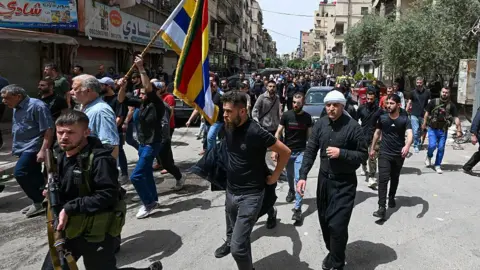Israel says it struck gunmen attacking Druze in Syria after deadly clashes
 AFP
AFPIsrael's military chief has said it struck "operatives" who attacked civilians from the Druze community on the outskirts of Damascus, after an outbreak of sectarian violence that has reportedly killed more than 40 people.
Lt Gen Eyal Zamir said he had instructed Israeli forces to prepare to strike Syrian government targets if such attacks on the religious minority continued.
A BBC team witnessed air strikes around the mainly Druze town of Ashrafiyat Sahnaya and neighbouring Sahnaya, and heard the sound of sporadic but heavy gunfire.
Syrian forces later said they had completed an operation there to "restore security and stability" after attacks by "outlaw groups" killed 16 of their personnel.
The Syrian Observatory for Human Rights (SOHR), a UK-based monitoring group, reported that six Druze gunmen had also been killed during the fighting in the area.
Another three Druze were killed by security forces as they tried to drive from the southern province of Suweida to Ashrafiyat Sahnaya, it said.
And three injured Druze were evacuated by Israeli forces to a hospital in northern Israel on Wednesday evening, the Israeli military said.
Earlier this week, at least 17 other people were killed in clashes between Druze gunmen, security personnel and pro-government fighters in the mainly Druze suburb of Jaramana, to the east, before calm was restored, according to the SOHR.
The violence erupted after an audio clip of a man insulting the Prophet Muhammad circulated on social media and angered Sunni Muslims.
It was attributed to a Druze cleric, but he denied any responsibility. The interior ministry also said a preliminary inquiry had cleared him.
The Druze faith is an offshoot of Shia Islam with its own unique identity and beliefs. Half its roughly one million followers live in Syria, were they make up about 3% of the population, while there are smaller communities in Lebanon, Israel and the occupied Golan Heights.
At a checkpoint on the road from Damascus to Ashrafiyat Sahnaya on Wednesday afternoon, a Syrian government security official told the BBC that attempts were under way to broker a truce between government forces and Druze militias.
The official said 16 of his men had been killed when they were attacked with RPGs and machine guns by Druze gunmen.
Earlier, a resident told the BBC by telephone that "extremist" groups were attacking Ashrafiyat Sahnaya and neighbouring Sahnaya from all directions.
"The townspeople are trying to resist the attack on their own, but we do not know how long we can hold out as there has been no presence of state security forces so far," she said.
She accused the government of complicity, saying security forces had "facilitated the movement of these armed groups" and were "blocking the entrances of the town".
The woman said she was waiting for news at home with her mother and siblings, while her father was defending the town with the other local men, not all of whom were Druze, adding: "There is nothing we can do but pray."
She said her town had "always been a symbol of peaceful coexistence", but that "it seems that sectarian incitement and foreign schemes aimed at dividing Syria are stronger".
Syria's transitional president, Ahmed al-Sharaa, has promised to protect the country's many religious and ethnic minorities since his Sunni Islamist group led the rebel offensive that overthrew Bashar al-Assad's regime in December after 13 years of devastating civil war.
However, the mass killings of hundreds of civilians from Assad's Alawite sect in the western coastal region last month, during clashes between the new security forces and Assad loyalists, heightened fears among minority communities and sparked calls for international protection.
Israel's military struck the outskirts of Damascus on Wednesday after Prime Minister Benjamin Netanyahu and Defence Minister Israel Katz said that a "serious message" had been conveyed to the Syrian government that they expected it "to act to prevent harm to the Druze".
Syria's foreign ministry said it rejected all forms of "foreign intervention" in its affairs, without explicitly mentioning Israel.
UN special envoy Geir Pedersen said he was "deeply concerned" by violence and "the potential for further escalation of an extremely fragile situation".
In February, Netanyahu warned that he would not "tolerate any threat to the Druze community in southern Syria" from the country's new security forces.
He also demanded the complete demilitarisation of much of the south, saying Israel saw Sharaa's Sunni Islamist group, Hayat Tahrir al-Sham (HTS), as a threat.
HTS is a former al-Qaeda affiliate that is still designated as a terrorist organisation by the UN, the US, the EU and the UK.
The Israeli military has already carried out hundreds of strikes across Syria to destroy the country's military assets over the past four months.
It has also sent troops into the UN-monitored demilitarised buffer zone in the Golan Heights, several adjoining areas and the summit of Mount Hermon.
